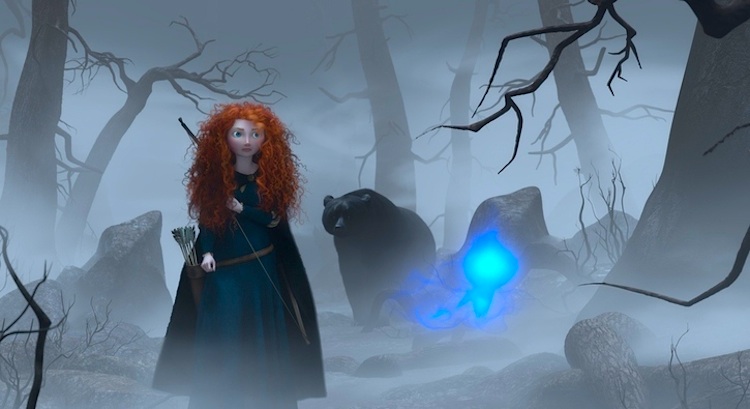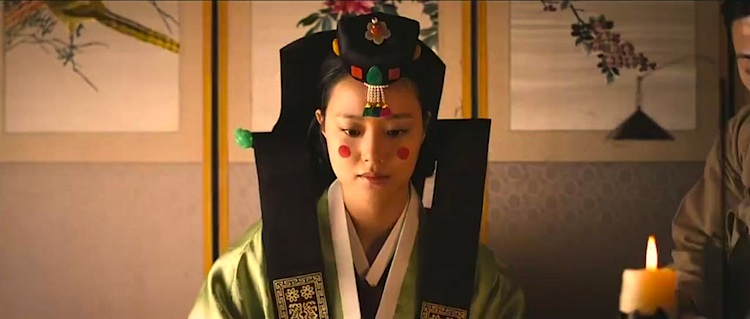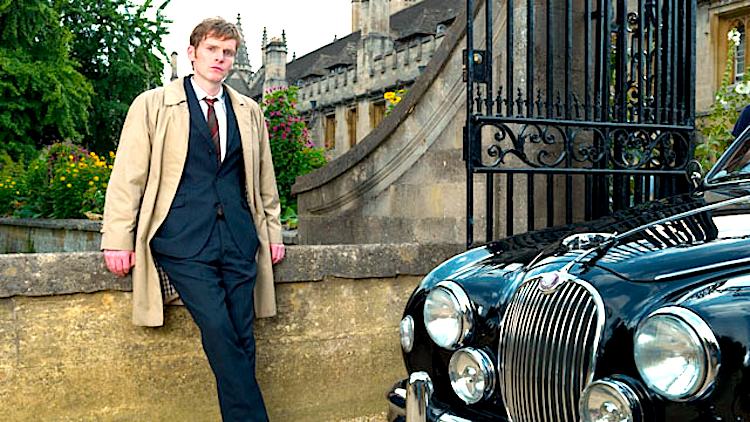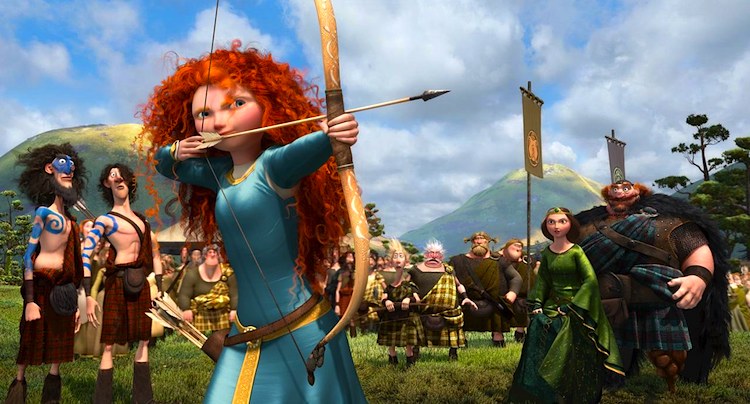
Mythic Themes in Pixar’s Brave
By Patricia Ducey. In a magical Celtic kingdom far, far away, lovely queen Elinor and her consort king Fergus are choosing a suitable husband for their daughter – but their sassy tomboy princess is one of those grrls who thinks she needs a man about as much as a fish needs a bicycle. In Pixar’s Brave, little Merida, our headstrong princess, rebels and hies to the forest on her trusty steed, her flaming red curls flying in the wind. Like many cinematic young female protagonists before her — Princess Ann in Roman Holiday, Princess Mia of The Princess Diaries, or even Wendy in Peter Pan — Merida craves independence and adventure as much as any boy or any commoner, and an arranged, political marriage inspires nothing but dread and an overwhelming urge to flee.
Merida’s effort to avoid marriage, which constitutes the first half of the movie, does not muster up much interest or suspense from an adult point of view. But at the midpoint, when Merida escapes into the forest to avoid her fate, the movie enters classical psychoanalytic symbol territory and becomes infinitely more compelling. A tiny CGI creature (think Tinkerbell) leads her deep into the forest, to the hut of an old crone who appears to be a wood carver. Merida soon discovers she can also cast spells, and begs the witch for a spell to help change her mother’s mind about the marriage issue. The witch warns her off – spells are tricky things and can go awry — but Merida brashly insists, and is soon on her way back to her castle, magic cake in hand. She tricks her mother into eating the toxic cake but is stunned when her mother suddenly transforms into a giant bear. The spell indeed has gone tragically wrong — and if Merida cannot break the spell in two days’ time, the transformation will be permanent. Merida has ignored the warning of the crone, and now she could lose her mother, as surely as if she had killed her, and ruin her kingdom, too — as the fragile peace treaty of the clans hinges on the alliance her marriage will create. In addition, the king has vowed revenge on Mordu, a huge killer bear, who had earlier chomped off his foot. Merida knows that Fergus will kill Elinor if he finds her in her bear form, thinking she is Mordu. Now, those are stakes.
Gory, frightening fairy tales are believed by many theorists (Bruno Bettelheim in particular) to be the material manifestations of the issues that children are consciously and subconsciously dealing with. And so Brave deals with Merida’s anxieties at the prospect of growing up, of maturing into a sexual being, and of relinquishing some of her freedom for the bond of love. As in Brave, fairy tales often insist on the need for just that: bravery, to overcome evil and teach children that these difficulties can be overcome. Brave also delves into the Oedipal/Electra conflict, where the child competes with the mother for possession of the father, or of an independent, public life. It is telling that in Merida’s family dynamic, her father Fergus is a bit of a clown (think Braveheart meets Fat Bastard) and plays but a peripheral role in the family. And so Merida’s primal bond, and conflict, rests with her mother. Her mother oversees Merida’s life; she teaches a bored Merida the geography and history of her kingdom, when she really wants to go out hunting; she teaches Merida the proper grooming and deportment of a queen, which Merida ignores to engage in rough sports. In a final betrayal, Elinor plans Merida’s betrothal, but Merida despises what she views as the lowly position of her mother and has no intention of becoming her. The fierce giant bear that Elinor morphs into is thus a symbol of what Merida fears most: a terrible grownup life as a mature woman and queen. Will she kill the mother, so that she can escape her abject fate? There must be a way out of this dilemma!
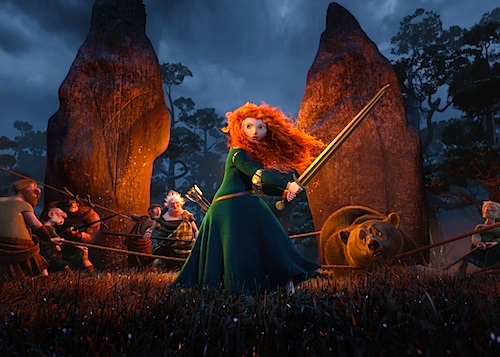
From Pixar's "Brave." So Merida calls forth the crone, who then appears to tell her that the only way to reverse the spell is to “mend the bond torn by pride.” It’s up to Merida to figure out which bond, or bonds, she has torn asunder and to fix them. If she refuses to marry any of the suitors chosen by the clans, the peace forged by a long ago treaty could collapse. If she wants to save her mother, she must give up her childish ways and assume the responsibilities of a queen.
Brave‘s animation is beautiful: rolling green hills and misty valleys and dappled sunsets, a change from the bold primary colors of, for instance, the Toy Stories. The only discordant note is the snappy modern dialogue style, which works against the movie’s deep chords of myth and emotion so reminiscent of a Disney film. But Brave is a very good movie for the wee bairns, who will probably enjoy the first half more than you, and fear the impending loss of Merida’s mother as strongly as you.
Can you change your fate, without throwing a fatal wrench into the delicate web of life? Brave, like other myths and legends, suggests we can, with a pure and courageous heart. And that lesson, as the good doctors of the psyche have told us, is a good thing.
Posted on June 28th, 2012 at 3:22pm.
